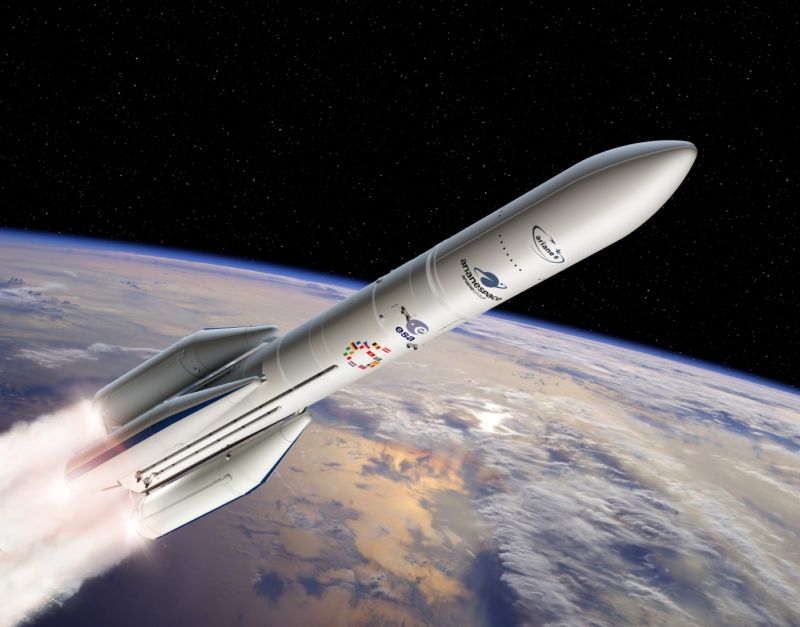
European space officials announced late last week that the debut of the Ariane 6 rocket will be delayed again—this time until the second quarter of 2022.
This large rocket, which roughly has a comparable lift capacity to SpaceX's Falcon 9 booster, was originally due to launch before the end of 2020. In May of this year, citing the COVID-19 pandemic, the European Space Agency acknowledged the debut launch would slip into 2021.
Now, during a teleconference with reporters, European officials said they're targeting the period of April through June 2022 for the first Ariane 6 flight. Again, they cited the global pandemic that has affected both activities at development facilities in Europe, and the rocket's launch site in French Guiana. "We can say today that COVID-19 has led to an extension of activities on the critical path," said Daniel Neuenschwander, the director of space transportation at the European Space Agency
However, he also acknowledged the rocket faces technical issues. The rocket's upper stage has an auxiliary power unit, designed to directly insert satellites into geostationary orbit, rather than a transfer orbit. But this is a new element, Neuenschwander said, and is not quite ready. The development teams are also still working on the cryogenic arms that link the pad and the rocket at the launch site.
These delays will come with increased costs. Neuenschwander and the European Space Agency's general director, Jan Wörner, said European member states will be asked to contribute an additional €230 million ($270 million) to complete development of the Ariane 6 rocket. Inclusive of these funds, development of the Ariane 6 rocket will cost about €3.8 billion ($4.4 billion), which includes a new launch site in French Guiana. Given a recent report by a French auditor, this funding does not seem guaranteed.
This is a lot of money to develop a rocket. However, it is still only about one quarter of the amount NASA has spent on recent large rocket projects, such as the Space Launch System, which has yet to fly, or the Ares I booster, which made a single test flight before its cancellation.
But neither of those rockets were intended to be competitive in a commercial market—launching payloads for private satellite companies or countries too small to have their own launch programs. Two years ago, European officials told Ars that the Ariane 6 rocket offers the continent's "best answer" to a rise in competition for commercial satellite launches. For a long time, Europe and Russia dominated this segment of the industry, but SpaceX has peeled off a lot of these communications satellite missions with its lower-cost Falcon 9 rocket.
In response to this competition, the Ariane 6 was designed to be more cost effective to fly. Originally, the European Space Agency planned to debut the Ariane 6 rocket by now. Although the rocket might cost more than a Falcon 9, it had the capability to deliver two large satellites to geostationary orbit and would come with several decades of launch reliability behind it. A few years ago, this seemed like a plausible argument.
However, since 2018, SpaceX has made significant strides with its Falcon 9 booster. The Block 5 version of the SpaceX rocket now ranks alongside the Atlas V booster as the most reliable launcher in the world and flies more frequently than any other rocket. Moreover, as SpaceX continues to prove out reuse, it can probably out-compete any other similarly sized rocket on price. Meanwhile, the Ariane 6 rocket's debut has slipped into 2022, and potential customers have no guarantees it will be ready to fly by then.
As the Ariane 6 will be Europe's main heavy-lift rocket, it will always have a baseline of institutional customers. This is because the ESA and member nations have satellites they don't want to trust to a foreign country. However, the difference between Europe's rocket industry making a profit, or requiring ongoing, substantial subsidies, will depend on the Ariane 6's ability to peel off commercial satellite launches. The forecast for this is less sunny than it was in 2018.
The Link LonkNovember 02, 2020 at 10:24PM
https://ift.tt/2I0cPdN
Europe’s “best answer” to competition from SpaceX slips again, will cost more - Ars Technica
https://ift.tt/2DVP6sH

No comments:
Post a Comment